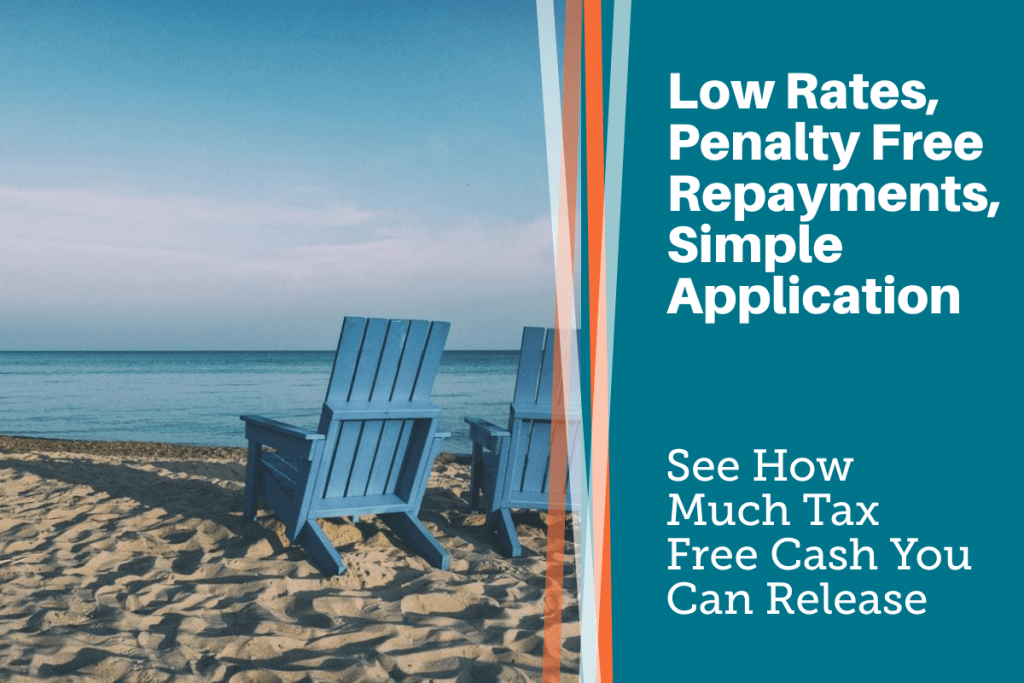Is Equity Release A Good Idea In 2025?

Is equity release a good idea? Yes, if you need the money, it can be an excellent idea. Some of the best reasons to get equity release include:
- Pay off an old mortgage where the lender insists on getting their money back
- Gift money to a family member so they can buy a home
- Pay off another high-cost credit that is not sustainable
- Having additional building works on the home to make it bigger and more valuable
- Using equity release to reduce death duties
If you are over the age of 55, then you may have an excellent opportunity to bring more stability and security to your finances and those of your loved ones.
Every year, thousands of individuals use equity release schemes to access the money locked away in their property. Allowing them to make the most of the hidden value their home holds.
Despite the current economic disruption in the UK, there are over 300 equity release plans worth considering. With such a wide selection, you can still find competitive interest rates, high loan-to-value ratios, and an array of long-term safeguards that ensure your plan fits your needs later in life.
Please Enter Your Requirements Below:


Is Equity Release A Smart Move? Lifetime Mortgage Choices
Any homeowner who owns the majority of equity in the property has various options to secure financing – for any reason. When you review your options, you’ll likely find information about equity release, or as they’re more often referred to as – Lifetime mortgages.
The question then becomes, is equity release a good idea? Because who’d willingly want to make a non-informed financial decision based on their biggest asset that takes decades to pay off?
Whether it’s a good idea depends on several factors, so the most suitable answer is – it depends. Not the most helpful, but stick around, and you’ll learn what it depends on.
At 1st UK, our team can advise you and facilitate family discussions by providing all the pertinent information related to your property’s wealth and how borrowing through equity release will affect what’s left behind for your family in your Will.
To explain how equity release could be a good idea, read through our FAQs below to see how Lifetime Mortgages work and affect future financing.
Do any of the following apply to you?
- Do you have a mortgage you need to pay off?
- Do you require money for repairs or home improvements? Like a new kitchen or bathroom.
- Would you like to help a family member purchase their first home?
- Would you like to pay off all your credit cards and loans and have zero monthly payments?
- Would you like a better lifestyle, change your car or have a well-deserved holiday?
Please Enter Your Details Below For A Free Quote

Equity Release FAQs to Help You Decide If It’s Right for You and Your Loved Ones
What’s Equity Release Anyway?
A good starting point is knowing exactly what we’re talking about. Equity release schemes cover a few different financing options, each based on the amount of equity you own in your property. An Equity release mortgage will release some of the equity you own in the property.
Most companies offering lifetime mortgages will insist they have the only charge on your title deeds, meaning you and (if applicable on joint applications) your partner has no other secured loans tied to your property. The reason is when both people are either in long-term care or deceased, the company to provide the loan can recuperate the loan amount with interest from the sale of your property.
Interest is charged as it usually is on any other type of secured loan; you don’t need to pay it back, but your family will have to when they inherit the property.
Will your kids inherit your debt?
Not quite. All equity release products are backed by a no-negative equity guarantee, meaning your loan value with interest will never supersede your home’s worth. So, your family is not going to owe anything.
How will a lifetime mortgage affect my kid’s inheritance?
The loan amount with interest that’s accumulated over the years will need to be repaid from your estate. Beneficiaries to your estate will only be inheriting the value of your estate after the loan plus interest is repaid.
How much are the interest rates for equity release?
Higher than most refinancing options as the lender is taking the risk of properties depreciating and has to honour the no equity guarantee. Average rates in 2025 for Lifetime Mortgages were 5%, but 2.12% is more than achievable. In comparison to standard financing rates, it can be slightly higher.
Some lenders will apply accumulated interest annually rather than monthly helping to control the overall cost of finance. Others aren’t as competitive.
Roughly 80% of equity release companies now allow you to further control the total cost of the loan by letting you pay all or part of the interest on the loan during the term without penalty and subject to additional terms.
Some lenders will let you pay a minimum of £25 monthly towards the interest, and others will let you pay all the interest, so your family only pays back the loan amount, plus any interest payments you don’t/haven’t made.
While most providers let you voluntarily pay down the interest repayable at the end of the equity release terms, you can find caps in place, such as 10% of the total loan value.
As an example frequently discussed with a lifetime mortgage Martin Lewis:
Taking a loan amount of £25,000 with a 5% APR would incur interest at £1,250 annually. To stay on top of that, you’d need to pay interest £1,250 each year for the rest of your life or until both names on the loan are in long-term care, and the property is sold.

In terms of how the financing affects your kid’s inheritance, consider this example:
You take out £25,000 on a Fixed Interest Roll-Up Lifetime Mortgage at 5.2% at the age of 55 on a single policy. Using a provider applying compounded interest annually, the loan amount would increase by £1,300 in the first year, £1367.60 in the second year, and so on.
At the age of 55, providing you’re in good health, you could reasonably expect the interest to accumulate for at least another 30 years, potentially doubling the total repayable to around £50,000.
If your property sells for £150,000, the loan plus interest of £50,000 would be taken from the sale of the property, reducing your estates’ value by £50,000 in this example, leaving your family with an inheritance of £100,000, assuming you have no other assets.
Can I repay the entire amount when I can? What is the catch with equity release?
You can pay back the loan plus interest at any time, but it’s rarely going to be a good idea due to early repayment charges. These are often high on lifetime mortgage products.
For example, Aviva’s advisory document for the Aviva Lifetime Mortgage states you’ll “never pay more than 25% of your initial loan amount”. The minimum you can borrow is £10,000, so based on 25%, you’d pay at least £2,500 to exit the agreement, plus the accumulated interest, such as if you’ve chosen not to pay any payments towards the interest.
Circumstances will change for both your and your family’s future, so it’s best to factor in how much it would cost if your circumstances changed and you needed to get the loan repaid to move property or refinance with another method.
1st UK has financial advisors experienced in working with families and equity release companies and know how important it is to be clear with our advice ensuring you make the decision that’s right for your family.
Will my home qualify, and do I need to pay advice fees?
Most lenders will require your property to be worth at least £100,000 to meet their security criteria. The reason for the minimum home valuation is that the loan term can run for decades as they’re designed to remain in place for the rest of your life. There are providers with lower minimum home valuations, but it’s rarely going to be less than £70,000.
Will I/We be eligible for a Lifetime Mortgage?
Personal circumstances are considered at the application stage. Instead of basing the loan amount on income as is required on other products, you need to own the majority of equity in your home. If a mortgage exists, that must be repaid entirely from the money you apply for.
Age will be a factor, too, but that will primarily affect the interest rate you’re offered as it’ll be lower for someone aged 55 years old (minimum age requirement) than it would be for someone aged 77 years old. Most applicants with full homeownership (100% equity and no additional secured financing in place) are eligible for lifetime mortgages.
How much can I borrow?
Equity release mortgage providers often have a minimum borrowing amount of £10,000. The maximum borrowing permitted differs by each lender. Some will arrange up to 50% of your current home valuation, with other lenders having lower limits. You’ll rarely be able to arrange for more than 50% of your home’s worth as the lender needs to ensure they don’t lose money if your home loses market value.
Will I still own my home or lose ownership?
Yes, you have provided you take out a Lifetime Mortgage, not a Home Reversion Plan. With a lifetime mortgage, funds are released based on using your home as security, just as you’d do with other types of secured financing.
Another type of equity release is home reversion schemes. With these, you’d sell some (or all) of your home equity to a holding company. If you sell all your equity through a home reversion scheme, you’d essentially be selling your home but keeping the right of tenure so you could live in your property rent-free as a tenant instead of a homeowner.
Are there any spending restrictions on what the money can be used for?
No. The money released from a lifetime mortgage is entirely yours to do as you like. No lender will ask what you intend to do. Your financial advisor should be, though, because if you plan to release money from property to invest, such as starting a business, there may be other funding options better suited to what you’re planning to do with the money raised.
Most lump-sum payments from lifetime mortgages are used for one-off life expenses like paying for your kids’ wedding, financing a new car, luxury holiday, home improvements, or landscaping the garden. The lump-sum option is best for those who know they’ll need to raise a lot of money for an expensive life event.
The other option is the drawdown lifetime mortgage, which is more suited to smaller loans with the option to borrow more in the future. With a drawdown lifetime mortgage, you can borrow a minimum of £10,000, and take out what you need under that, such as £5,000 to buy a used car paying interest only on the money released, which would be lower interest rates than most unsecured loans.
The remaining funds would be left on reserve serving as a buffer you can withdraw in the future without going through another application process.
Is the application process difficult – why equity release is a bad idea?
No, because you can only access these through an advisor, who’ll do all the form-filling for you. The most time-consuming part of the equity release process for applicants is gathering documentation.
Like all financial products, you need to provide documents—mostly legal documents about your property and providing identity verification documents such as a passport or driving licence. The lender you’re applying to will want to arrange for a home valuation report as they need to know the property’s worth what you say it is. Zoopla valuations don’t count.
How can I make sure I don’t get ripped off – equity release pitfalls?
Use a verified financial advisor such as 1st UK Money, which is experienced with equity release.
What is the catch with equity release? The potential issues with equity release are:
- High-interest rates on some products
- Greedy brokers that charge high fees
- Substantial redemption penalties
However, 1st UK Money has lenders with excellent terms, and the interest rates are very similar to standard mortgage rates. And 1st UK Money does not charge ludicrous fees, as some advisors do.
Many Boxing Day conversations will likely start with the question: Equity release, is it a good idea? It may be a brilliant idea for some families as it could enable good things that otherwise would be impossible.
What are the pitfalls of equity release – is equity release a good thing?
When you compare equity release with downsizing, one of the pitfalls of equity release is if UK house prices go down. If you think house prices will continue to rise, equity release is fine because the appreciation of house prices will likely dwarf equity release interest.
If you need to pay off an old interest-only mortgage, equity release or a lifetime mortgage may be your only option to stay in your home and enjoy your home through your retirement, so it is very much the lesser evil of downsizing. If you have a nice semi-detached or detached house with a garden and downsizing means you end up in a flat with noisy neighbours above, below and to the side, the mathematics of roll-up interest are hardly the end of the world.
All lifetime mortgage and equity release products have fixed rates, so there are no problems with rising interest rates – someone else has assumed that risk for you.
What does Martin Lewis say about equity release?
Martin Lewis, the founder of MoneySavingExpert.com, is a vocal advocate of equity release as a financial tool that can be used to fund retirement or pay for home repairs and improvements.
He has spoken publicly about how it “makes sense” for those who are asset-rich but cash-poor, providing much-needed access to capital.
He also emphasizes the importance of researching all equity release products in detail before committing to one, examining their advantages and potential risks.
To Summarise, is equity release a good idea to access cash…
There are two critical components to making equity release work for you and your family – the problems with equity release:
- Getting expert financial advice from trusted, transparent and experienced advisors
- Discussing things with your family because equity release will reduce your estate’s value
1st UK Finance can talk you through your options for equity release at 55 or above, work with you to find the right solution to your circumstances and then compare the whole market to match you with the best lender with the right product tailored to suit your financial needs.
Other pages related to Martin Lewis lifetime mortgages where you can work out pros and cons of equity release:
- RBS Royal Bank Of Scotland alongside the equity release council based on your main residence
- LV= Liverpool Victoria for great equity release advice and no arrangement fees
- Pure Retirement ER a great equity release product based on your personal details
- For 80 Years and Older for great independent financial advice
- Equity Release Options 60+ for an equity release scheme overview
- Release Equity For Schooling Fees and other tax free cash
- Aviva, alongside an independent financial adviser
- Just Retirement for releasing equity with your homes full market value
- Canada Life with independent legal advice on means tested state benefits and council tax
- Pros and Cons of an equity release plan for raising funds in around eight weeks
- For 90 Years And Above with a clear equity release agreement
- Equity Release For Over 70’s with no valuation fees for your cost effective later life financial goals
- Equity Release For Second Home Purchase with no legal fees
- HSBC that engages family members with the equity release calculator
- Lloyds Bank to repay an existing mortgage with no advice fee
- Saga equity release considerations for 2025- the value of your property could affect
- Hodge Lifetime with no early repayment charge and penalty-free partial repayments
- Equity Release For Under 55 via a mortgage broker
- Legal and General with no impact on means tested benefits
- Sunlife Equity Release alongside financial advisers
- Plans For Elderly and Pensioners at a fixed interest rate
- Gifting Equity To Loved Ones based on your financial situation
- Equity Release For Elderly Care and repay an outstanding mortgage
